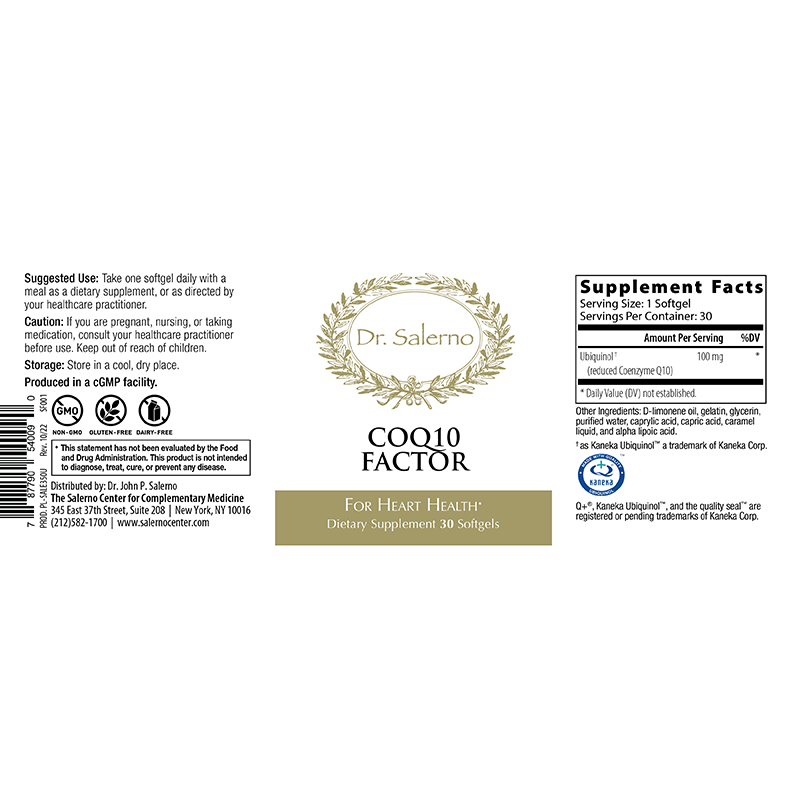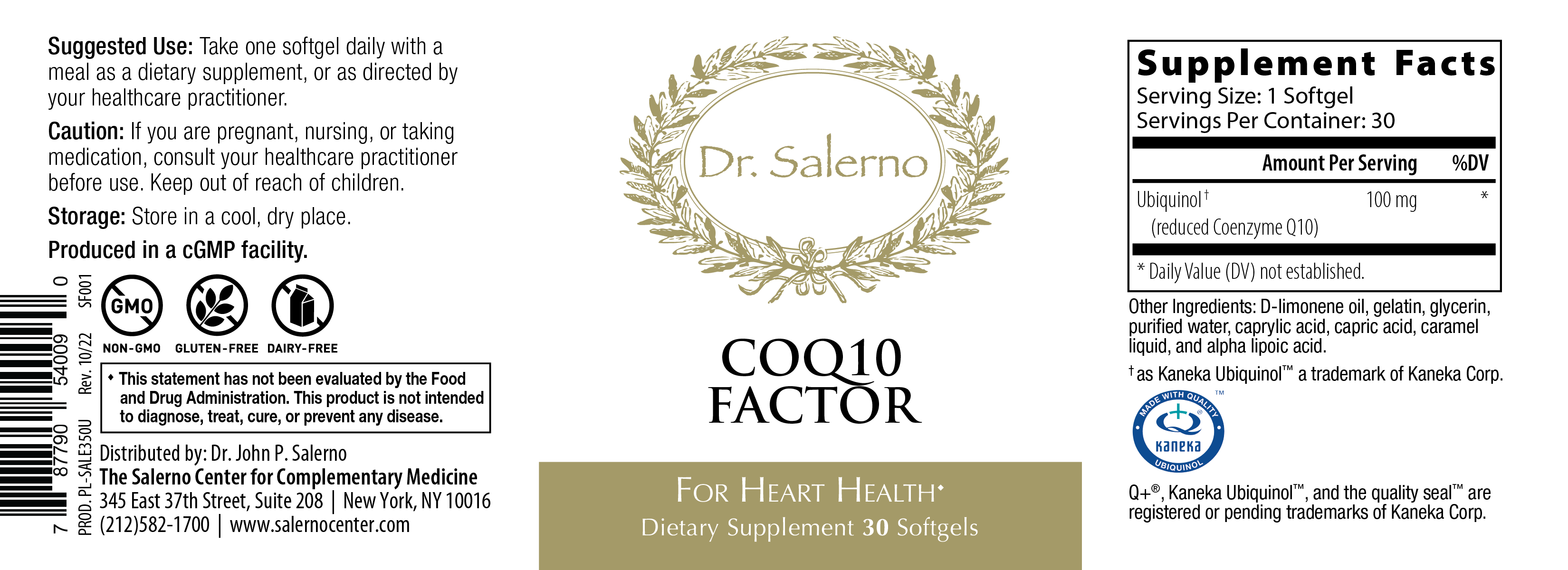

CoQ10 Factor
Dr. Salerno's CoQ10 Factor is a leading-edge supplement.
What is CoQ10?
Coenzyme Q10 (CoQ10), also known as ubiquinone, is a proenzyme produced naturally within the body. CoQ10 plays a critical role in energy (ATP) production and is one of the most powerful known lipid-soluble antioxidants, protecting cells, organs and tissues from damage caused by oxidative stress and free radicals. CoQ10 inhibits protein and lipid oxidation and protects mitochondrial DNA from oxidative damage. This CoQ10 formulation is delivered in an oil-based proprietary form and includes natural vitamin E for enhanced absorption and maximum stability.
CoQ10 is a lipid-soluble antioxidant found in every cell in the body. CoQ10 is abundant in the mitochondrial membrane and plays an important role in the synthesis of adenosine triphosphate (ATP), a molecule of chemical energy upon which all cellular functions depend. The synthesis of ATP within the mitochondria is a multi-step series of biochemical reactions called the electron transport chain. As a coenzyme, CoQ10 is required for several enzymatic reactions required to produce cellular energy and to protect the body against free radicals produced during this process. To maintain energy production, mitochondrial CoQ10 is continuously recycled from ubiquinone, its ATP production state, to ubiquinol, its antioxidant state. After the age of 35 to 40 years, endogenous synthesis of CoQ10 begins to decline. CoQ10, an essential component of cellular energy production, has been shown to extend cell life and benefit high-energy systems, namely the cardiovascular, neurological and immune systems.
CoQ10 Depletion
The body’s ability to produce and metabolize CoQ10 has been reported to decrease with age. CoQ10 deficiency may be caused by insufficient dietary intake of CoQ10, impairment in CoQ10 production, drug-induced CoQ10 depletion, gene mutations and oxidative stress. HMG-CoA reductase is an enzyme required for the synthesis of cholesterol and CoQ10. Cholesterol-lowering medications inhibit this enzyme in order to reduce cholesterol synthesis, but may also simultaneously deplete CoQ10 status. Thirteen controlled studies conducted between 1990-2004 demonstrated significant CoQ10 depletion, secondary to use of statin medications used to lower cholesterol levels.2 These studies demonstrated a range of 19- 54% decrease in CoQ10 levels in patients on statin therapy. In the event of CoQ10 depletion, supplementation can improve CoQ10 status and help maintain optimal levels in the body.
Antioxidant Protection
Oxidative stress is a condition that occurs when there is an imbalance between free radicals and the antioxidants required to neutralize them, leading to oxidative damage in the body. The extent of oxidative stress depends on the rate of free radical generation, the level of antioxidant reserves and the rate of repair of cellular and tissue damage. This process has a significant impact on the body’s aging process. In its role in electron transport, CoQ10 continuously goes through an oxidation-reduction cycle in order to neutralize free radicals and provide significant protection against toxic oxidative reactions in the body.
CARDIOVASCULAR HEALTH
CoQ10 is important for all energy-dependent processes and is especially helpful in strengthening contraction of the heart muscle. CoQ10 is also important for protection against free radical damage to the arterial vessels. In a double-blind, crossover trial 19 patients received 100 mg CoQ10/day or placebo for 12 weeks. Compared with placebo, patients receiving CoQ10 demonstrated significant support of cardiac function and increased tolerance for physical activity.3 In another study, 109 patients received an average dose of 225 mg of CoQ10 per day. After a mean treatment period of 4.4 months, CoQ10 helped in maintaining healthy blood pressure levels in more than half of the patients.4 CoQ10 has been shown to be a preventive factor in reducing low-density lipoprotein (LDL) oxidation- a major factor for supporting healthy cholesterol levels.
Blood Sugar Balance
The electron transport chain, a biochemical pathway in which CoQ10 plays a major role, significantly impacts carbohydrate metabolism. CoQ10 has been shown to support healthy blood sugar metabolism.7 In one study, 39 subjects received 120mg of a CoQ10 analog for 2-18 weeks. Fasting blood sugar levels were maintained in the normal range, along with a 30% decrease of ketone bodies in 59% of patients- an indicator of healthy blood sugar metabolism.
Neurological Health
Neurons are characterized by high rates of metabolic activity and the need to respond quickly to energy demanding fluctuations in the brain. Mitochondrial alterations, leading to reduced ATP production, can promote neuronal dysfunction and degeneration via increased production of reactive oxygen species in the central nervous system. As an effective carrier with strong antioxidant properties, CoQ10 has been shown to support neurological health.
Supplement Facts
Serving Size:1 Soft Gel Capsule
Servings Per Container: 30
| 1 Soft Gel Capsule Contain: | Amount Per Serving | % Daily Value* |
| Ubiquinol(Kaneka Ubiquinol) | 100mg | * |
| ** Daily Value not established | ||
Directions
1 or more soft gel capsules per day or as recommended by your healthcare professional.
Disclaimer
These statements have not been evaluated by the Food and Drug Administration. This product is not intended to diagnose, treat, cure, or prevent any disease. Always consult with your physician before taking any dietary supplement.


